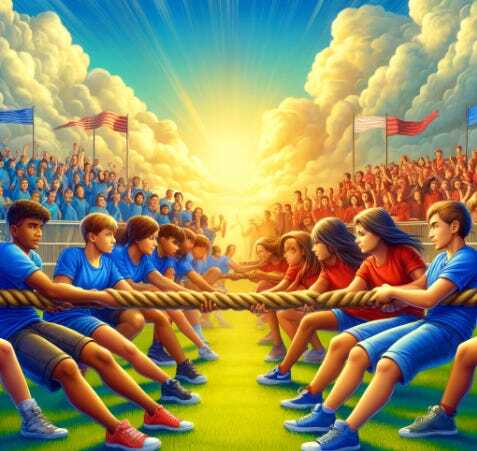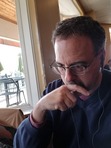Teach the Tension

And when I am formulated, sprawling on a pin,
When I am pinned and wriggling on the wall,
Then how should I begin
To spit out all the butt-ends of my days and ways?
And how should I presume?
T.S. Eliot’s poetic protagonist, J. Alfred Prufock, a favorite character from my high school reading, is permanently stuck. He sits in dull parlors and measures out his life in coffee spoons while feeling dissected and judged like a dead animal on display. It’s fitting that we read about him in high school, because far too often, that’s how teachers seem to treat their academic curriculum: like it’s a dead thing pinned to a display case—finished, fully understood, capable of being summarized in a mediocre book or lab report by any student paying meagre attention. Not just easily digestible by children, but pre-chewed for them. No wonder students are bored by it; I’m bored, just writing about it.
Scenes from a Broken Hand is a reader-supported publication. To receive new posts and support my work, consider becoming a free or paid subscriber.
It’s an easy mistake to make. The curriculum is made up of skills and content: skills are things kids need to do; content is stuff kids need to know. “Stuff to know” suggests that the stuff is know-able and, in fact, already known by the adults and experts charged with teaching it. How could state boards of education approve of learning content and standards if it’s not all agreed upon? How can publishers make fancy books with glossy covers if the stuff inside isn’t pretty much settled?
There are two problems with this belief. One: a lot of what’s in those books is not really “settled.” Two: many of the things that are settled got that way through years of struggle. So we have historical struggle that may be ongoing or may be ended, and in either case, it’s rendered inert in a summary paragraph in a textbook. We know how the fight ended, so who cares about the fight?
Well, we should, for a variety of reasons. The fight is more interesting than the outcome, for one thing, and if we want our curriculum to be engaging, we shouldn’t jump straight to the end of the movie, or drain it of all its dramatic power by giving a quick summary. The fight can also be instructive—maybe as instructive as the thing being fought over.
Everything in the world that students inhabit—everything—came about through conflict and struggle, trial and error, hypothesis and experimentation, and sometimes sheer chutzpah. You could probably pick anything at random that’s visible to your students at any given moment, and find an interesting story about how that thing came to be—and, possibly, how it almost didn’t come to be. The world we have is a lot more contingent than we let on.
I was no fan of history as a subject when I was in school. I found it absolutely tedious. But the year after I graduated from college, I was asked to write a play about the treason trial of Aaron Burr for my university’s law school, which had a beautiful fake courtroom with abundant audience seating used for mock trials. (This was long before Burr became a well-known figure again, thanks to Lin-Manuel Miranda.) I knew nothing about the topic. None of my friends did, either. For all of us, our American history education went from the Declaration to the Constitution and then straight to the events leading up to the Civil War.
So, I went off to the library to research it. And man, what a fun and ugly and scandalous story it was! For the first time in my life, I was digging into primary sources (including the trial transcripts and contemporary newspaper reporting from a young Washington Irving) and the works of actual, grown-up historians—people who had contradictory ideas and opinions about the events, and who had amassed research to back up those opinions. Which of them was right? Which of them had an agenda? Was Burr really a bad guy? Was Jefferson really a good guy? What actually happened back then? WHY WAS IT SO HARD TO KNOW?
It was fascinating. And exciting. And I’ve been reading history ever since.
Why was none of that part of my high school curriculum? Why was I handed heavily edited summaries and conclusions about history, day after day, rather than being asked—even occasionally—to weigh the evidence and draw my own conclusions? Why wasn’t I given the opportunity to learn—to be guided carefully and planfully to learn—how challenging and fraught that process can be, and how tentative and cautious our conclusions should be? Some kids do get this experience, but why shouldn’t every 18 year old emerge from their K-12 schooling knowing how to research, how to evaluate, how to form an informed opinion, and, maybe most importantly, how to be humble about what they think they’ve learned? What would our recent experience with COVID, masking, and vaccines have been like in that world?
When you read grown-up history, not only do you plunge yourself into a world where people today disagree about what happened long ago; you also learn much more about the people who disagreed about what was happening while it was happening. And once you get beyond textbook summaries about who won and who lost, you can start appreciating the nuances of some of the arguments—you start realizing that in many cases, the battles were between different aspects of what is good and right, not simply between what is good and what is evil, what is right and what is wrong. The battles are hard.
There are arguments happening in our own political world that go all the way back to the founding of the country. Some of them you may be able to write off as good guys vs. bad guys—abject racists are bad; I don’t feel the need to consider their point of view. But many of those arguments have lasted for hundreds of years because they’re hard—because there is merit on both sides. On some topics, we are in a permanent state of tug-of-war, and we should be. We don’t really want one side to be completely victorious; we want to figure out where in the middle we want to live.
For example: we believe in personal freedom (the pursuit of happiness). We believe in equality (all men are created equal). These are both lovely ideas. But they often work in opposition to each other, not always in harmony. The freedom to pursue my happiness might mean the freedom to excel beyond others. Am I free to win, if other kids have to lose? Not everyone has the same opinion on that topic, especially where younger kids are involved. Mandated or legislated equality would infringe on freedom. And we want it to, to some degree. We want a leveled playing field when it comes to externals like race or class or gender. Do we want a leveled playing field when it comes to individual abilities? Kurt Vonnegut played with this tension nicely in his story, Harrison Bergeron. The goal for most of us, I think, is not either/or—it’s both/and. But how much freedom? How much equality? How do we want to balance that scale? When you demonize the other side of the argument, no balancing is possible—everything is zero-sum.
Freedom and security live in the same kind of tension, although we pretend they’re equal and harmonious goods. We want to be left alone to do as we please. We also want to be kept safe. I want cops on the street, but I don’t want them to stop me when I’m speeding, but I do want them to stop that other guy who’s speeding if he looks dangerous. I want to be able to move freely across state lines, without constant checkpoints and searches. I also want to be protected from terrorism. How much of one am I willing to sacrifice for the other?
People have struggled over these competing goods as long as there have been people. Our founders had them front-of-mind when they constructed our state and federal governments. As adults in a free society, we have to engage with these questions all the time. Why doesn’t our schooling do a better job of preparing us to be the kinds of citizens our country needs? Where else are we supposed to train young people to engage in the open, respectful dialogue and debate that self-governance requires?
Instead of racing through a curriculum of kings and wars and greatest-hits events, where everything is known and settled, and simply needs to be memorized, why can’t we slow down, every once in a while, and let kids grapple with things? Why not let them read contradictory accounts? Why not let them debate ideas—and be forced to research and represent both sides before knowing which side they’ll have to argue?
Wouldn’t we be more likely to give each other the benefit of the doubt in our complex, diverse society, if we had been trained in school to think more divergently, to learn that there are two or more sides to every argument, and that in most cases, all sides have some merit worth considering before rendering judgment? Wouldn’t we be better equipped to cast votes on the topics of our own day if we understood better what got us here, and how hard it was to get us here, and how many mistakes we’ve made along the way?
______________________
*The idea has been expressed, in one form or another, by authors as various as Thucydides, Machiavelli, Orwell, and (possibly) Churchill.
Scenes from a Broken Hand
- Andrew Ordover's profile
- 44 followers



